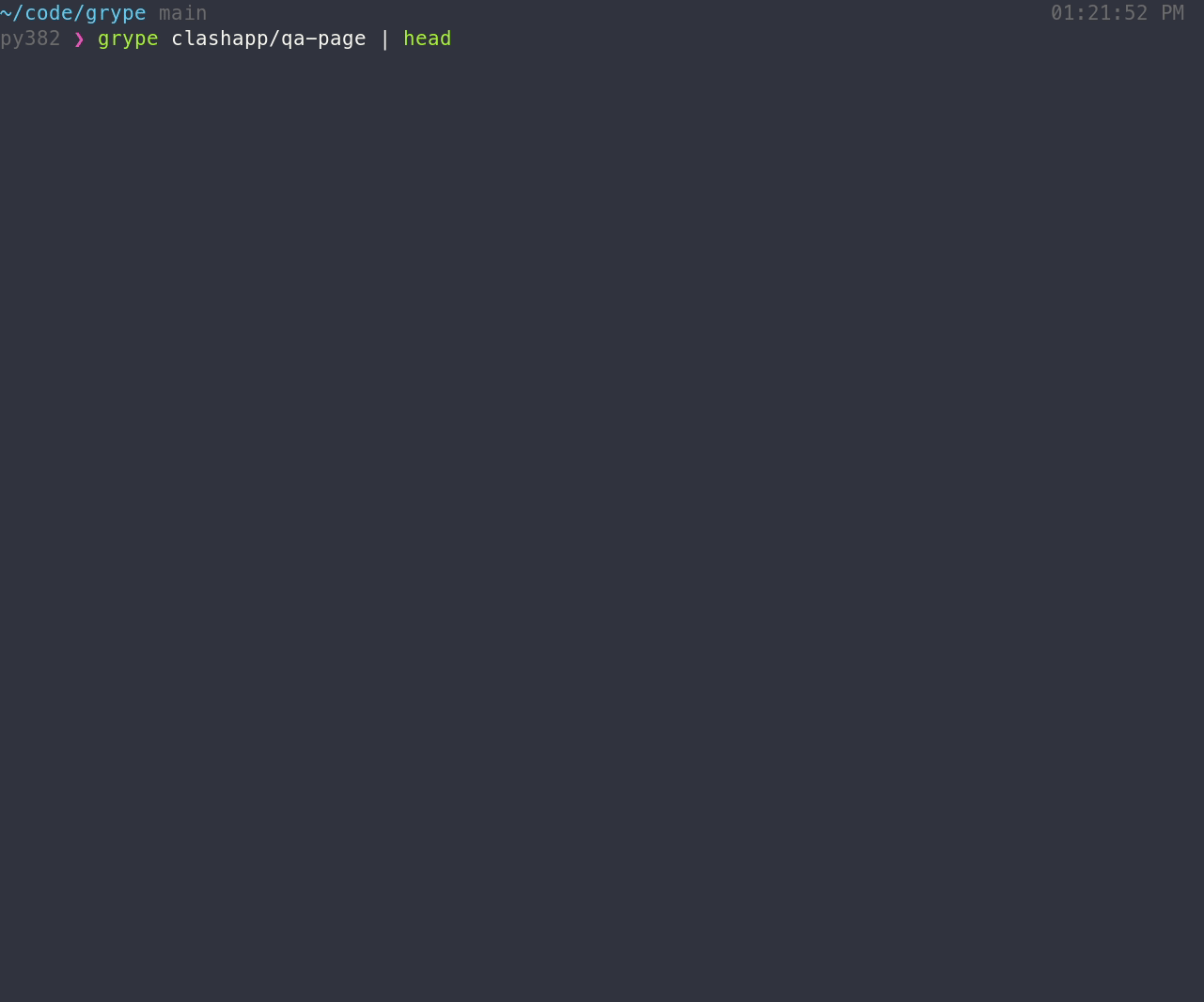anchore / Grype
Projects that are alternatives of or similar to Grype
grype
A vulnerability scanner for container images and filesystems. Easily install the binary to try it out.
Features
- Scan the contents of a container image or filesystem to find known vulnerabilities.
- Find vulnerabilities for major operating system packages
- Alpine
- BusyBox
- CentOS / Red Hat
- Debian
- Ubuntu
- Find vulnerabilities for language-specific packages
- Ruby (Bundler)
- Java (JARs, etc)
- JavaScript (NPM/Yarn)
- Python (Egg/Wheel)
- Python pip/requirements.txt/setup.py listings
- Supports Docker and OCI image formats
If you encounter an issue, please let us know using the issue tracker.
Getting started
Install the binary, and make sure that grype is available in your path. To scan for vulnerabilities in an image:
grype <image>
The above command scans for vulnerabilities that are visible in the container (i.e., the squashed representation of the image).
To include software from all image layers in the vulnerability scan, regardless of its presence in the final image, provide --scope all-layers:
grype <image> --scope all-layers
Grype can scan a variety of sources beyond those found in Docker.
# scan a container image archive (from the result of `docker image save ...`, `podman save ...`, or `skopeo copy` commands)
grype path/to/image.tar
# scan a directory
grype dir:path/to/dir
The output format for Grype is configurable as well:
grype <image> -o <format>
Where the formats available are:
-
json: Use this to get as much information out of Grype as possible! -
cyclonedx: An XML report conforming to the CycloneDX 1.2 specification. -
table: A columnar summary (default).
Grype pulls a database of vulnerabilities derived from the publicly available Anchore Feed Service. This database is updated at the beginning of each scan, but an update can also be triggered manually.
grype db update
Installation
Recommended (macOS and Linux)
# install the latest version to /usr/local/bin
curl -sSfL https://raw.githubusercontent.com/anchore/grype/main/install.sh | sh -s -- -b /usr/local/bin
# install a specific version into a specific dir
curl -sSfL https://raw.githubusercontent.com/anchore/grype/main/install.sh | sh -s -- -b <SOME_BIN_PATH> <RELEASE_VERSION>
Homebrew (macOS)
brew tap anchore/grype
brew install grype
Shell Completion
Grype supplies shell completion through its CLI implementation (cobra). Generate the completion code for your shell by running one of the following commands:
grype completion <bash|fish>go run main.go completion <bash|fish>
This will output a shell script to STDOUT, which can then be used as a completion script for Grype. Running one of the above commands with the
-h or --help flags will provide instructions on how to do that for your chosen shell.
Note: Cobra has not yet released full ZSH support, but as soon as that gets released, we will add it here!
Configuration
Configuration search paths:
.grype.yaml.grype/config.yaml~/.grype.yaml<XDG_CONFIG_HOME>/grype/config.yaml
Configuration options (example values are the default):
# enable/disable checking for application updates on startup
check-for-app-update: true
# same as --fail-on ; upon scanning, if a severity is found at or above the given severity then the return code will be 1
# default is unset which will skip this validation (options: negligible, low, medium, high, critical)
fail-on-severity: ''
# same as -o ; the output format of the vulnerability report (options: table, json, cyclonedx)
output: "table"
# same as -s ; the search space to look for packages (options: all-layers, squashed)
scope: "squashed"
# same as -q ; suppress all output (except for the vulnerability list)
quiet: false
db:
# check for database updates on execution
auto-update: true
# location to write the vulnerability database cache
cache-dir: "$XDG_CACHE_HOME/grype/db"
# URL of the vulnerability database
update-url: "https://toolbox-data.anchore.io/grype/databases/listing.json"
log:
# location to write the log file (default is not to have a log file)
file: ""
# the log level; note: detailed logging suppress the ETUI
level: "error"
# use structured logging
structured: false
Future plans
The following areas of potential development are currently being investigated:
- Support for allowlist, package mapping
- Establish a stable interchange format w/Syft
- Accept SBOM (CycloneDX, Syft) as input instead of image/directory



